
Nat Gould
His life and books
Pilsbury Grange Letter 3
Letter 3 of the Letters from Pilsbury Grange is dated 15 July 1843, and was written by Margaret Gould 1783-1844 to her son Richard Goodwin Gould 1822-1892.
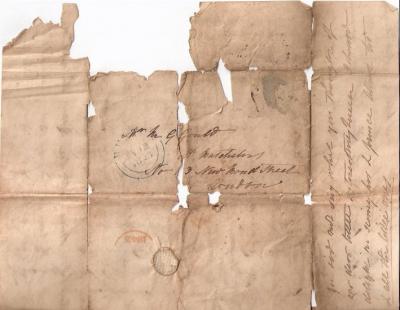
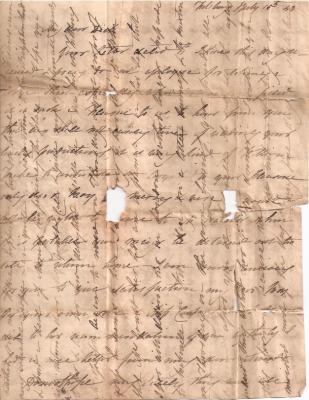
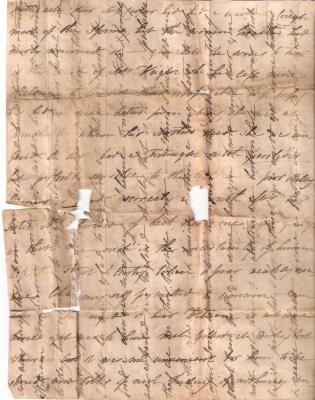
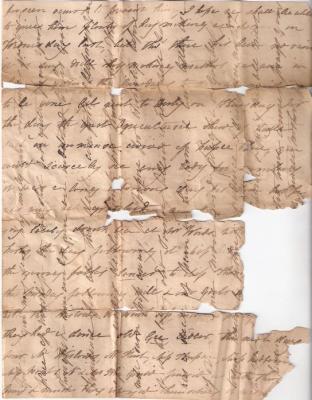
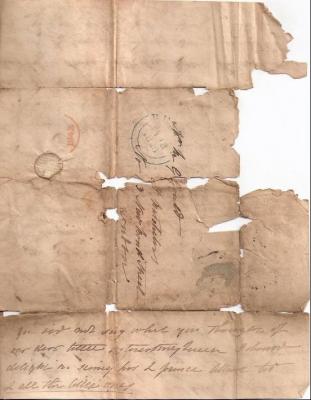
[[In the following transcription the * sign means a portion of the letter now missing.]
[[Page 1] [[Postmark] BUXTON Jy 18 1843
Mr R G Gould
Mr Batchelors
3 New Bond Street
London
[[Page 2] Pilsbury July 15 43
My dear Dick
Your letter dated 11th I have this day received, & pray do not apologise for taking a large Sheet especially when it is so filled It is such a pleasure to us to hear from you that we shall not easily tire of reading your lively production, it is very kind of William Peake to under take so largely to your pleasure only dear Boy * mercy & kind regard not his right to * to Mr Batchelor when it is probablie your ? he detained out too late to return home – I am most anxious for you to give satisfaction my dear Boy for your own sake, & Miss Cooper * are due to her name ? ? of you to * I had a nice letter from my dear Freinds at Donisthorpe very lately they are all
[[Page 3]
pretty well dear Miss Cooper had had a violent Cough most of the Spring, but the wormer Weather has nearly unwrent it - You will be sorry to hear of the Death of Mrs Wright, she has left nine children to provide their * also Up keeping * had a nice letter from Mary, she was at Manchester when his Mother died, he was confined to his bed a Fortnight in bed – paralysis but perfectly sensible to the last - & poor Nelly * is dead * a * after her Sister Mrs * of Leek, she is one year younger than me - such is the uncertainty of human life, the * & lively taken, & poor weakley remnants like myself permitted to remain – you will be surprised to hear William is not come home yet, we should have met Gilbert at Derby last Thursday but it was not convenient for him to be spared now talks of next Friday if nothing un-
[[Page 4]
for seen occurs to prevent him, I hope we shall be able to give him plenty of hay making now begun on Wednesday last but there has been no rain it is very dull hay making weather, we were in hope of getting the Narr dales to day but * to be done Gil went to Derby on Thursday for the day the great Agricultural show of Cattle such an immense crowd of people there you could scarcely see any body too * it such a long lively * day for him but * was very well gratified * lately drank tea at Mr Woods with * the day following at Miss Red- * the young folkes danced to Miss Thom- * the Monday following Gill & our Girls * with the Wislows at * They had a dance old Gee, Fidler, The next day * Mr Wislows, Mr Flint, Miss Thompson, Miss Redfern, Miss Brookes, Mr & Mrs John Gould favoured us with their * & much they enjoyed them selves it was *
[[Page 2 cross written]
neether Nat nor William happened to be at home very sociable people & agreeable an acquisition to the Neighbourhood & spend a deal of Money on improving the place - I hope you will return dear Mrs Goulds Call & give my affectionate regards to her & tell her how delighted I shall be to see her at Pilsbury Mr Joseph began to mow on Thursday & great crops of grass he seems to have, I was sorry to here that Mr John that Mrs Gould has had a inflammation in his leg that I fear will detain him in London rather longer. Bess rode to Bakewell on Wednesday on a little business & to Buxton on Thursday on the same business. Your freinds all enquired after you at Bakewell. She saw all the Taylors indeed they wished her to stay dinner, I write to you this afternoon because we are not on the hay it his moistire most of the day & next fine day we shall be
[[Page 3 cross written]
be very busy that I am sure I shall not have time for writing William Jenkinson came last night, he ? to Ashborne today but returns to night I am sorry to here Robert is so poorly * agree with him tell him I shall be very glad to see him at Pilsbury, I know he find a change necessary, I believe Tom & his Wife & family are expected in England shortly, that is, it is very probable they are on ther voyage soon - I think I have told you all the news now & have only Written a long Letter to Miss Cooper, I am almost tired, the repair to the shirts you Talk of I think I can post you some but you know very that you must post home an additional button hole to your Wrist bands first, but I should think you could get some Buttons & needle & thread & sew a Button on very easily yourself
[[Page 4 cross written]
God keep you my dear Boy. surely you sometimes go to a place of worship - do not shut God quite from your thoughts - soon our ? you are subdued to his Grace providence for all the daily comforts & blessings you enjoy & Cheerily * for * this World will soon pass away * prepare for eternity before it is too late also Journey Allong in heart * Will has has a deal of pain in his arm & him little use of it since March * * * prays your affectionate Mother
M Gould
[[PS on Page 1]
You did not say what you thought of our dear little interesting Queen I should delight in seeing her & prince Albert too & all the little ones
Until well into the nineteenth century it was quite usual to end a sentence with a comma, and to start the next with a lower case letter. Margaret Gould was clearly a well educated lady, and really remarkable for maintaining the farm of Pilsbury Grange after her husband Edmund Gould 1782-1833 died and until her young sons had settled down in life. (Edmund Gould was mentioned in Letter 1 as having had a severe illness or serious accident while working at Rochdale. Fortunately he recovered, married and raised a family, but he died relatively young in 1833 aged only 51 years.)
There are many gaps, tears and folds in the letter, and pieces of the brittle paper have broken off and been lost. The gaps have been denoted with an asterisk. A few words are uncertain, and these are denoted with a question mark. The writer herself made a few omissions and occasionally repetitions. Margaret Gould had written a long letter, and was becoming tired.
As well as being important to Gould family researchers, the letter is also interesting from a philatelic point of view. There was no need in 1843 for folding a letter up, sealing it with wax, and posting it unpaid. That was what had been done since the seventeenth century, the recipient paying the postage, calculated on distance travelled and the number and size of sheets in the letter. But in 1840 Rowland Hill had introduced the penny post, and putting the letter in an envelope and affixing a penny red adhesive stamp would have been sufficient for it to reach London safely.
But Margaret Gould was an elderly lady, and the old custom endured at Pilsbury Grange. So the letter was folded, sealed and taken to Buxton post office unfranked. There it was postmarked in blue ink three days after the letter was written, and sent off - probably by mail coach to Stockport and thence by train. Arriving in London it was again postmarked, this time in red, but only the year is visible.
Of the people mentioned in the letter:
[[page 2]
William Peake will have been a relative of the writer, born Margaret Peake, but apparently a distant one. He may have been William Peake born in 1802, the son of her second cousin Richard Peake born in 1757 and his wife nee Anne Downs 1771-1818. There was a William Peake 1802-1880 living on private means with his wife Elizabeth at 17 Westbourne Park Villas, Kensington in London recorded in the Census Returns for 1861 to 1881.
Miss Cooper was presumably Catherine Cooper (see Letter 2) who was one of the "Freinds at Donisthorpe".
[[page 3]
The identities of Mrs Wright and Nelly are unknown.
Mary was the writer's daughter Mary Gould 1826-1873.
William and Gilbert were the writer's sons William Gould 1819-1876 and Gilbert Gould 1821-1891.
[[page 4]
Gil was the writer's son Gilbert Gould 1821-1891.
Mr Flint would be Cornelius Flint, the mineral agent for the Duke of Devonshire and living in Hartington.
Mr & Mrs John Gould were of the Lower House family and then resident at Ludwell.
The identities of the others mentioned are unknown.
[[Page 2 cross written]
Mrs Gould would be Mrs John Gould of Ludwell.
Mr Joseph was Joseph Gould, brother of John Gould, then resident at Pilsbury Lower House.
Bess was the writer's daughter Elizabeth Ann Gould 1827-1868 who later married Ralph Dain 1822-1863.
Who the Taylors were is unknown.
[[Page 3 cross written]
The identities of William Jenkinson, Robert, and Tom & his Wife & family are all unknown.
